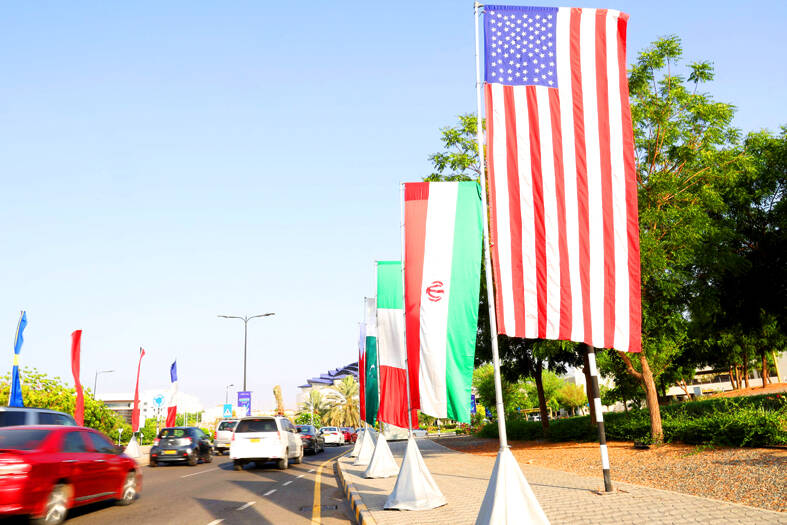Iran and the US on Saturday held in-depth negotiations in Muscat over Tehran’s rapidly advancing nuclear program, ending the discussions with a promise for more talks and perhaps another high-level meeting next weekend.
Iranian Minister of Foreign Affairs Abbas Araghchi told state television after the talks, which ran for several hours, that the parties exchanged written points throughout the day in discussions that he described as “very serious and work-focused.”
“This time, the negotiations were much more serious than in the past, and we gradually entered into deeper and more detailed discussions,” he said. “We have moved somewhat away from broader, general discussions — though it is not the case that all disagreements have been resolved. Differences still exist both on major issues and on the details.”

Photo: AFP
A senior US administration official said that the talks were “positive and productive.”
“This latest round of direct and indirect discussions lasted over four hours,” the official said on condition of anonymity. “There is still much to do, but further progress was made on getting to a deal. We agreed to meet again soon, in Europe, and we thank our Omani partners for facilitating these talks.”
Omani Minister of Foreign Affairs Badr al-Busaidi, who has mediated the two previous rounds of talks in Muscat and Rome, offered a positive note at the end of Saturday’s negotiations.
Iran and the US “identified a shared aspiration to reach agreement based on mutual respect and enduring commitments,” al-Busaidi wrote on X. “Core principles, objectives and technical concerns were all addressed. Talks will continue next week with a further high level meeting provisionally scheduled for May 3.”
The talks seek to limit Iran’s nuclear program in exchange for the lifting of some of the crushing economic sanctions the US has imposed on the country closing in on a half-century of enmity.
US President Donald Trump has repeatedly threatened to unleash airstrikes targeting Iran’s program if a deal is not reached. Iranian officials increasingly warn that they could pursue a nuclear weapon with their stockpile of uranium enriched to near weapons-grade levels.
Iran’s 2015 nuclear deal did limit Tehran’s program. However, Trump unilaterally withdrew from it in 2018, setting in motion years of attacks and tensions.
Trump, traveling to Rome for the funeral of Pope Francis, said that he hoped negotiations would lead to a new nuclear deal. However, he still held out the possibility of a military strike if they did not.
Iran has insisted that keeping its enrichment is key, but Witkoff has muddied the issue by first suggesting in a television interview that Iran could enrich uranium at 3.67 percent, then later saying that all enrichment must stop. The demand that all enrichment stop also has been repeated by US Secretary of State Marco Rubio.

Rainfall is expected to become more widespread and persistent across central and southern Taiwan over the next few days, with the effects of the weather patterns becoming most prominent between last night and tomorrow, the Central Weather Administration (CWA) said yesterday. Independent meteorologist Daniel Wu (吳德榮) said that based on the latest forecast models of the combination of a low-pressure system and southwesterly winds, rainfall and flooding are expected to continue in central and southern Taiwan from today to Sunday. The CWA also warned of flash floods, thunder and lightning, and strong gusts in these areas, as well as landslides and fallen

WAITING GAME: The US has so far only offered a ‘best rate tariff,’ which officials assume is about 15 percent, the same as Japan, a person familiar with the matter said Taiwan and the US have completed “technical consultations” regarding tariffs and a finalized rate is expected to be released soon, Executive Yuan spokeswoman Michelle Lee (李慧芝) told a news conference yesterday, as a 90-day pause on US President Donald Trump’s “reciprocal” tariffs is set to expire today. The two countries have reached a “certain degree of consensus” on issues such as tariffs, nontariff trade barriers, trade facilitation, supply chain resilience and economic security, Lee said. They also discussed opportunities for cooperation, investment and procurement, she said. A joint statement is still being negotiated and would be released once the US government has made

SOUTH CHINA SEA? The Philippine president spoke of adding more classrooms and power plants, while skipping tensions with China over disputed areas Philippine President Ferdinand Marcos Jr yesterday blasted “useless and crumbling” flood control projects in a state of the nation address that focused on domestic issues after a months-long feud with his vice president. Addressing a joint session of congress after days of rain that left at least 31 dead, Marcos repeated his recent warning that the nation faced a climate change-driven “new normal,” while pledging to investigate publicly funded projects that had failed. “Let’s not pretend, the people know that these projects can breed corruption. Kickbacks ... for the boys,” he said, citing houses that were “swept away” by the floods. “Someone has

‘CRUDE’: The potential countermeasure is in response to South Africa renaming Taiwan’s representative offices and the insistence that it move out of Pretoria Taiwan is considering banning exports of semiconductors to South Africa after the latter unilaterally downgraded and changed the names of Taiwan’s two representative offices, the Ministry of Foreign Affairs (MOFA) said yesterday. On Monday last week, the South African Department of International Relations and Cooperation unilaterally released a statement saying that, as of April 1, the Taipei Liaison Offices in Pretoria and Cape Town had been renamed the “Taipei Commercial Office in Johannesburg” and the “Taipei Commercial Office in Cape Town.” Citing UN General Assembly Resolution 2758, it said that South Africa “recognizes the People’s Republic of China (PRC) as the sole